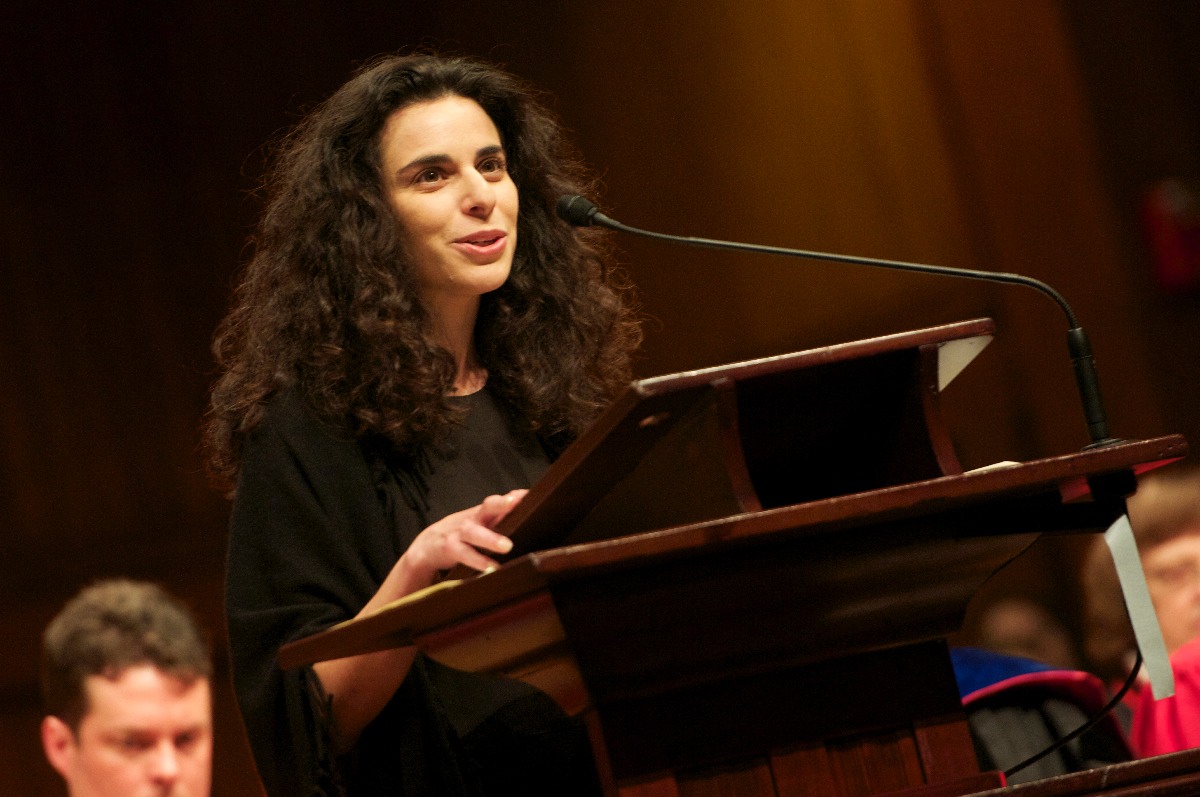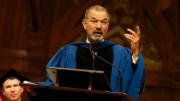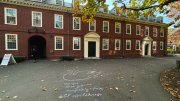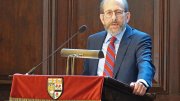Sheltered from the morning’s intermittent mist, an audience in Sanders Theatre heard poet Robyn Schiff and Renaissance scholar Stephen Greenblatt speak at the 226th Phi Beta Kappa (PBK) exercises, which on Tuesday formally opened this year’s Commencement celebrations.
Schiff, who teaches in the English department of the University of Iowa, read four poems: one from her book, Revolver, which was a finalist for the 2008 PEN award, and three from her recently published collection A Woman of Property. Greenblatt, Cogan University Professor of the humanities, gave an address entitled “Liberal Arts Education and ‘The Waiting Spring of Intelligence,’” which began with his recollections of studying English at Yale in the 1960s, as one of only a few Jewish students there. (More detailed background on both speakers can be found here.)
Robin Kelsey, Burden professor of photography and the Faculty of Arts and Sciences’ incoming dean of arts and humanities, oversaw the ceremonies for the first time in his capacity as Alpha Iota chapter president. In his introductory remarks, Kelsey summarized the history of the society’s founding, before launching into a discussion of what election to Phi Beta Kappa meant. In addition to being an eye-catching résumé highlight, Kelsey said, membership promised “a social bond.”
"Unlike some other societies bearing ancient Greek initials, Phi Beta Kappa is not embroiled in any campus controversy—of which I am aware," he noted, giving a significant look to College dean Rakesh Khurana amid general laughter and a round of applause.
Kelsey continued, "If you show the requisite amount of scholarly achievement while at Harvard College, whatever your sex, gender, or sexual orientation, election into our chapter can be your reward. Who knew that Phi Beta Kappa would be so hip in 2016?" (Read the Literary Exercises program.)
Teaching Prizes
Wolcott professor of philosophy Alison Simmons presented three honorees with the Phi Beta Kappa Teaching Prizes. Nominated by the society’s undergraduate members and selected by its undergraduate marshals, they were:
- Kiran Gajwani, a lecturer and adviser in the economics department “renowned for her senior research seminar,” and described by her students as “free-thinking and knowledgeable.”
- senior lecturer on Buddhist literatures Charles Hallisey, who, in the words of the citation, “combines philosophical rigor with warmth and intimacy to help students find profound wisdom in truly unexpected places.”
- Brigitte Libby, an assistant dean of Harvard College, who “makes the ancient Roman world come alive for her students through space-time travel.” (The honorand was absent, reported Simmons, “for the happiest of reasons”: Libby had given birth to her daughter over the weekend.)
Honorary Members
The chapter also conferred honorary membership on College alumni from the fiftieth-reunion class, and on a retiring faculty member. Selected and presented by chapter secretary Logan McCarty, director of physical sciences education, they were:
- Jack Strominger, Higgins professor of biochemistry. The citation noted that Strominger, who is celebrating his seventieth reunion, entered the College in the middle of World War II: "This was Harvard on a war schedule: three semesters each year, with no summer vacations.” Strominger devoted his career to studying immunology, and in 1968 joined the Harvard committee that would become the department of molecular and cellular biology. Called “a legendary mentor” (and himself a recipient of the Lasker Award and Japan Prize), Strominger counts nine Harvard professors and one Nobel laureate among his former lab members, and has continued to work with undergraduates.
- Marsha Berzon ’66, a federal judge on the Ninth Circuit Court of Appeals since 2000. Berzon was the first female law clerk for Supreme Court Justice William Brennan and, in her career in private practice, represented labor unions with a focus on gender discrimination. During that time, she argued a number of landmark cases regarding pregnancy discrimination and family leave.
- Jo Ann Moran Cruz ’66, associate professor of history at Georgetown University. The citation commended Cruz for founding medieval studies at Georgetown; she also recently launched an EdX course on Dante.
- Barbara Underwood ’66, solicitor general of New York. Among the first women to receive tenure at Yale Law School, Underwood then left academia to work at the office of the District Attorney in Brooklyn. She told The New York Times in 1998, ''I thought, 'I don't have to do things in the order that everyone else does them. Life is long.' ''
- Robyn Schiff, the poet
The Poet
“Preparedness and authenticity are no doubt on your mind as you reflect during this Commencement week,” Schiff told the audience, and so, "The first of these poems is quite practical. It regards a particularly elaborate Swiss Army knife." Following as it did the Radcliffe Choral Society’s performance of Fauré’s “Cantique de Jean Racine, Op. 11,” praising the grace and gifts of the divine, this verse from her poem was especially bracing: “I do not believe in awe/Every pick has a lock it alone fits.” Schiff’s voice was swift, and slightly rasping; her selections were—almost playfully—menacing. “Gate” gave the beloved Beatrix Potter children’s story a frightening edge: “Peter did not/enjoy himself anymore. He never would/again”; later, in the poem “H1N1,” she declared, “No one is allowed/to touch me/for infection is a hazard of mercy.” Closing with “Fourth of July, 2012” (a riff on Antigone, and on CERN scientists’ discovery of the “God particle”), Schiff left the graduating seniors this final wish: “Happy Independence Day to you—may you be independent, and may you be free thinkers.”

Robyn Schiff Photograph by Jim Harrison
The Orator
Resplendent in his robes—conspicuously blue—Greenblatt spoke about the value of the liberal arts, foregrounding his remarks with his own undergraduate experience some 50 years ago. Descended from Lithuanian immigrants, and raised by parents who hadn’t attended college, the young Greenblatt encountered Yale as “an unfamiliar country whose customs I knew I could never master.” (The title of his speech, he explained, was a play on a 1904 quote from Henry James, in which he—with distaste, not admiration—described the “waiting spring of intelligence” within the immigrants he observed in New York; Greenblatt, in 1960, embraced this quality in himself.) The professor then recounted two formative freshman-year experiences: a dispiriting exchange with an anti-Semitic financial-aid officer (“Even decades later I recall it with a blend of outrage and wonder”), and encountering the “rapacious Jewish usurer, Shylock,” in Shakespeare’s The Merchant of Venice. Despite the prevailing xenophobia of his time, the playwright, Greenblatt said, had created a villain who nevertheless has “more theatrical vitality, quite simply more life—intense, urgent, and compelling—than anyone in his world.”
Unwilling to be defeated by the administrator’s cold shoulder or his parents’ resignedly “defensive posture,” Greenblatt resolved, “I would not turn away from works that caused me pain as well as pleasure. Instead, insofar as I possibly could, I would pore over the whole, vast, messy enterprise of culture as if it were my birthright.” He added, “What you inherit—what you receive from a world that you did not make but that will try to make you—is at once beautiful and repellant. You somehow have to come to terms with what is hateful as well as what is precious. No one, but no one, is exempt.”
Human culture can insist on the consciousness of the stranger, Greenblatt continued; this separates humans from the chimpanzees he observed last February in Uganda, who couldn’t tolerate the presence of foreign groups of their own species. He closed his remarks with a monologue, attributed to Shakespeare, from a manuscript of a sixteenth-century play about Sir Thomas More, in which the fictionalized More stands against a mob demanding that foreigners be sent out of England. And so, the professor reminded the students, they, too, would encounter huddled masses of strangers. “You will have to decide for yourselves how you will deal with them—to look away or become involved, to secure your safety or to open yourself to risk, to succor or to punish. What I fervently hope is that you begin and end with Shakespeare’s gift, the gift of seeing the other as a human being.”









